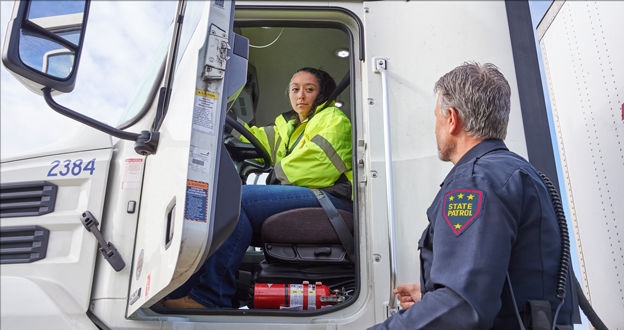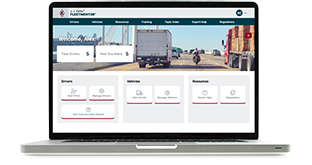Transport Safety Editor — J. J. Keller & Associates, Inc.
What’s That '392.2' Violation on Your Roadside Inspection Report?
One question that often comes up is, “What do those letters mean after the '392.2' on our roadside inspection report?” Here's what you need to know.
Published On: 03/27/2025


Written by:
Corrina Peterson
One question that often comes up when reviewing roadside inspection reports is, “What do those letters mean after the “392.2” on our roadside inspection report?”
State and local laws
Local or state laws, regulations, or ordinances must be obeyed due to 392.2, the federal regulation that says, “Every commercial motor vehicle must be operated in accordance with the laws, ordinances, and regulations of the jurisdiction in which it is being operated.”
The confusion is that there are no paragraphs in 392.2, so there technically should be no letters following that section. However, to inform the driver, carrier, and the Federal Motor Carrier Safety Administration (FMCSA) what particular state or local law or regulation was involved, FMCSA has developed a system of suffix codes. The letters following 392.2 — the “suffix” — indicate which state or local law or regulation was involved.
When one of these codes is used, the officer should include a description of the specific violation in the “violation details” area on the actual inspection report.
To add to the confusion, summary roadside inspection reports (such as the ones visible in Compliance, Safety, Accountability (CSA) Safety Measurement System (SMS)) do not show these details.
Not all 392.2 violations are used in your CSA score
Not all of these state and local law or regulation violations are used by the FMCSA for scoring purposes. The SMS does not use the 392.2 violations that cannot be tied to crash causation, for example:
- 392.2UCR Failure to pay UCR (Unified Carrier Registration) fee, and
- 392.2W Size and weight.
Most common 392.2 violations
Below are some of the most common 392.2 violations written by roadside enforcement officers. All these violations are safety-related, and therefore used in the CSA SMS for scoring. The SMS category that the violation is scored in is shown following the violation description:
- 392.2SLLS2 Speeding 6-10 miles per hour over the speed limit (Unsafe Driving)
- 392.2C Failure to obey traffic control device (Unsafe Driving)
- 392.2LV Lane Restriction violation (Unsafe Driving)
- 392.2SLLS3 Speeding 11-14 miles per hour over the speed limit (Unsafe Driving)
- 392.2WC Wheel (Mud) flaps missing or defective (Vehicle Maintenance)
- 392.2SLLS4 Speeding 15 or more miles per hour over the speed limit (Unsafe Driving)
- 392.2ML Failure to maintain lane (Unsafe Driving)
- 392.2SLLSWZ Speeding work/construction zone (Unsafe Driving)
- 392.2PK Unlawfully parking and/or leaving vehicle in the roadway (Unsafe Driving)
- 392.2FC Following too close (Unsafe Driving)
FMCSA does not write traffic codes. They rely on local and state agencies to do that. When those state or local traffic codes are violated, it appears on a roadside inspection report as a violation of 392.2, with a suffix indicating which traffic code was involved.
The self-tracking and auditing tool in FleetMentor can help you ensure that the inspections reported by FMCSA are accurate and should be included in your CSA scores. Self-tracking can also help you measure the success of your corrective actions by allowing you to generate reports for predictive scoring.

J. J. Keller® FleetMentor® Service
The J. J. Keller® FleetMentor® System serves and supports thousands of transportation professionals every day with problem-solving tools and guidance. Whether you have one truck or a thousand, a fleet of commercial motor vehicles or F-150s, or haul goods or provide services — FleetMentor has you covered.
You may also enjoy the following articles:
Sign up for our newsletter!
We'll help you stay on top of regulations, best practices, and fleet industry news. Sign up to receive a monthly email notification with links to our most recent blog articles, free resources, and event invites.